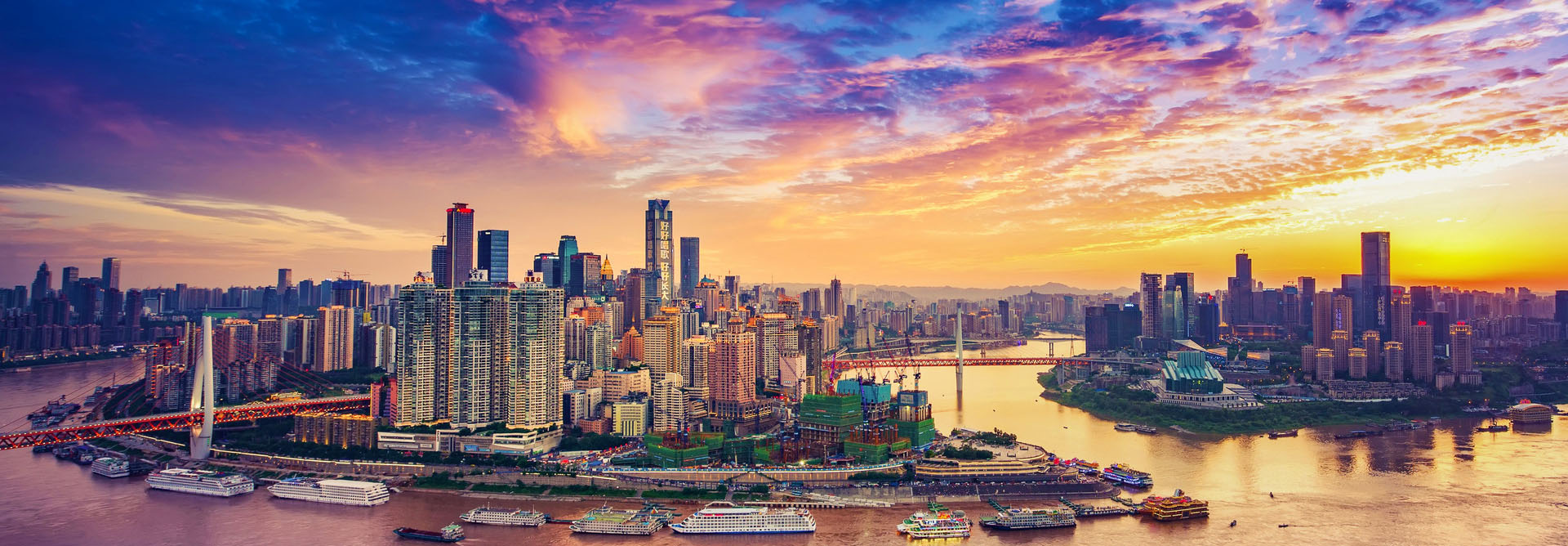
Situated in the west plain of Sichuan Basin, south-central part of China, Chengdu is the capital city of Sichuan Province. During the last 3000 years, Chengdu city has served as the political, economic, and cultural center of the province and an important transportation hub connecting cities from all directions in China. Since ancient times, the city has been praised as “county of heaven” or “land of abundance” (Tian Fu Zhi Guo in Chinese). 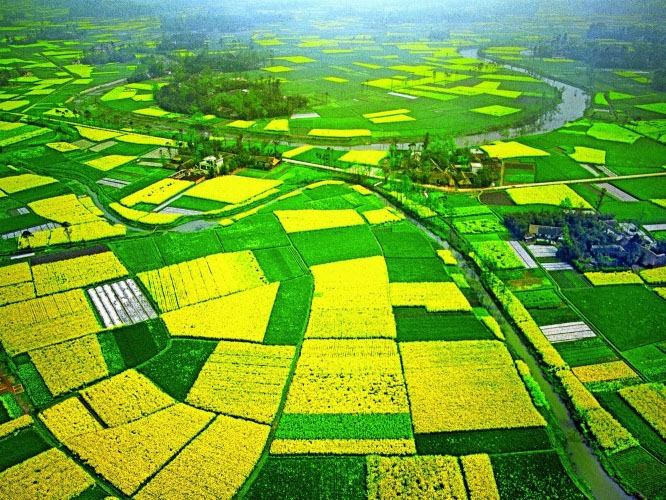
It boasts abundant local products, a great number of scenic spots, and historical places. Visitors can admire the exquisiteness of Shu Brocade, the melody of Sichuan Opera, and the daintiness of Sichuan Cuisine. If you are a fan of natural beauty, you can climb the Qingcheng Mountain and E’mei Mountain for the magnificent view and tranquil atmosphere, visit the cute Pandas - the national treasure of China and wander in the marvelous Jiuzhaigou Scenic Spot. While if you are interested in the cultural relics, Chengdu is also an ideal spot. There is a world-famous Sanxingdui (Three-Star Piles) Museum for early Chinese history, Du Fu Thatched Cottage for Tang poems and literature, Leshan Giant Buddha, and Wenshu Monastery for Buddhism culture, Wuhou Temple for the great wisdom of Zhuge Liang. Most importantly, Chengdu is a city to lay back and relax. Welcome to Chengdu and spend your peacetime!
In 311BC, the Qin people built the Chengdu city modeling after the Xianyang city in Shaanxi province. In 256 BC, the Dujiangyan Water Conservancy established by Shu county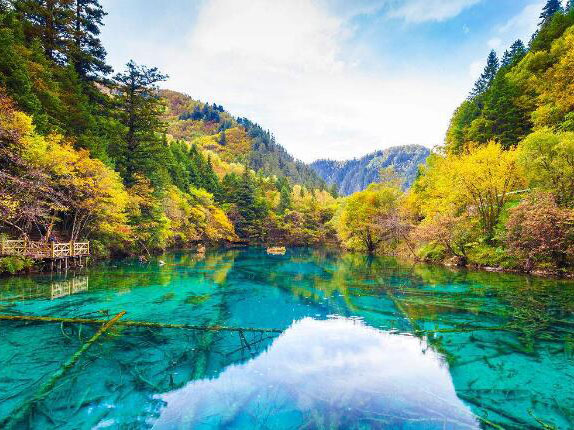 magistrate Li Bing began to change the overflowing Chengdu plain into a place with fertile land, a warm climate, and rich natural resources. Chengdu is also lauded as "Flower City" as lush flowers and trees are surrounding the dense rivers that protect the city.
magistrate Li Bing began to change the overflowing Chengdu plain into a place with fertile land, a warm climate, and rich natural resources. Chengdu is also lauded as "Flower City" as lush flowers and trees are surrounding the dense rivers that protect the city.
Besides, Chengdu has always been a political, economic, and military center in southwest China. During the Tang and Song dynasties, the music, dance, and Sichuan opera flourished and well-known all over China; among them, Sichuan opera was hailed as "the best opera in the world." Besides, the musical instrument manufacturing in Chengdu is also world-famous. Last but not least, the Chinese Tea Culture originated from Sichuan. According to the existing poems, the earliest tea drinking was from Chengdu. In Tang and Song dynasties, Chengdu was the main area of tea production and trading. Therefore, Chengdu has a unique teahouse culture and also the most teahouses in the world.
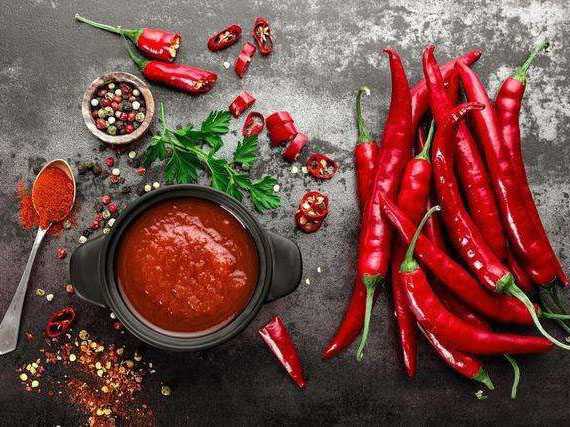 the Qinling Mountains in the north, Daba Mountain in the east, and Yungui Plateau in the south. It belongs to the subtropical humid monsoon climate zone, characterizing warm and humid climate all year round, distinct seasons, and rich annual rainfall. Many rivers pass by the plain, including Minjiang River, Tuojiang River, Fujiang River, Jinsha River, Yalong River, and Dadu River. According to records, Sichuan Basin served as a sanctuary for animals in Ice Age; the million-old giant panda is strong proof.
the Qinling Mountains in the north, Daba Mountain in the east, and Yungui Plateau in the south. It belongs to the subtropical humid monsoon climate zone, characterizing warm and humid climate all year round, distinct seasons, and rich annual rainfall. Many rivers pass by the plain, including Minjiang River, Tuojiang River, Fujiang River, Jinsha River, Yalong River, and Dadu River. According to records, Sichuan Basin served as a sanctuary for animals in Ice Age; the million-old giant panda is strong proof.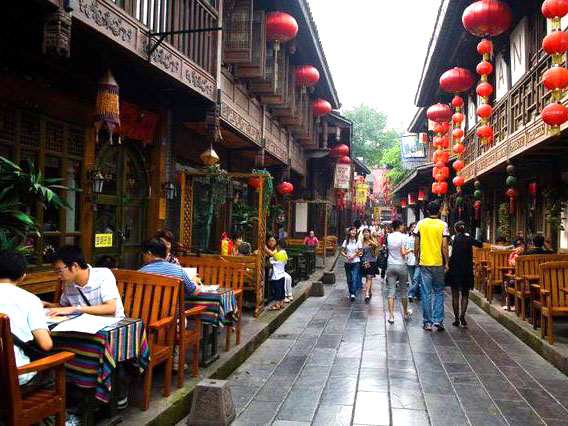 In ancient times, tea houses in Chengdu always served as a place for recreation, gathering, business, and civil court. With local performances on the stage, people often went to tea houses for entertainment. They could watch a show while enjoying some local snacks. For friends coming from a distance, tea houses have always been ideal places for gathering and enjoying the play. Ancient people sometimes invited their business partners for a cup of tea while completing a transaction. Last but not least, the tea houses also served as the civil court in Chengdu. If a conflict or a dispute arose between neighbors or friends, they would go to the tea houses and invite a person of great prestige to be the judge. The losing party would pay for all the tea consumed.
In ancient times, tea houses in Chengdu always served as a place for recreation, gathering, business, and civil court. With local performances on the stage, people often went to tea houses for entertainment. They could watch a show while enjoying some local snacks. For friends coming from a distance, tea houses have always been ideal places for gathering and enjoying the play. Ancient people sometimes invited their business partners for a cup of tea while completing a transaction. Last but not least, the tea houses also served as the civil court in Chengdu. If a conflict or a dispute arose between neighbors or friends, they would go to the tea houses and invite a person of great prestige to be the judge. The losing party would pay for all the tea consumed. Nowadays, tea houses are more like places of leisure. One can order a cup of tea and enjoy local food while sitting with friends chatting, playing cards, chess, or mahjong.
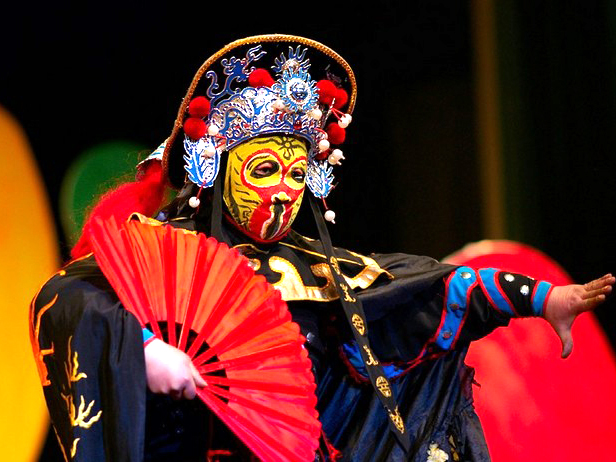 and Yunnan Province, with its vivid, humorous narration, singing, and acrobatics. Integrating the tunes of operas from the Jiangsu, Jiangxi, Anhui, Hubei, Shaanxi, and Gansu provinces, it also boasts unique movements, acting styles, and musical instruments.
and Yunnan Province, with its vivid, humorous narration, singing, and acrobatics. Integrating the tunes of operas from the Jiangsu, Jiangxi, Anhui, Hubei, Shaanxi, and Gansu provinces, it also boasts unique movements, acting styles, and musical instruments. 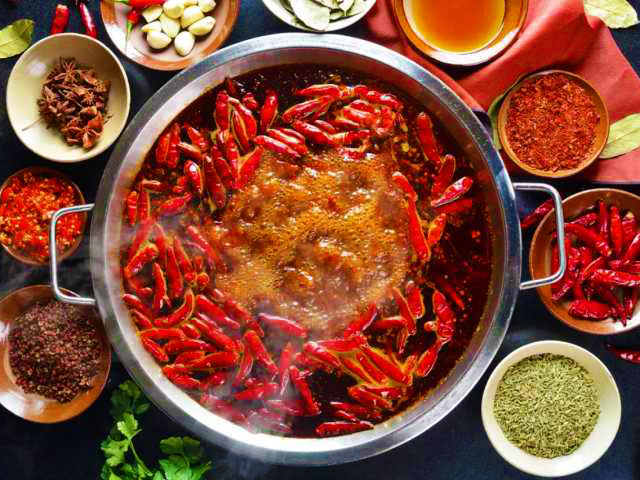 With thousands of years of history, Hot Pot is not like the original Hot Pot in the Western Han Dynasty. It is now more diversified and prevalent. Whether gathering friends or meeting someone, Hot Pot is always a good choice as a meal.
With thousands of years of history, Hot Pot is not like the original Hot Pot in the Western Han Dynasty. It is now more diversified and prevalent. Whether gathering friends or meeting someone, Hot Pot is always a good choice as a meal.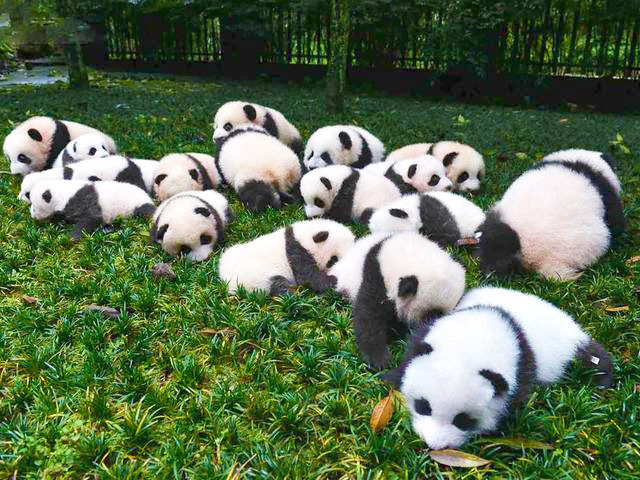 some even serve nothing but Hot Pot. Compared to Chongqing Hot Pot - a type of the Sichuan Hot Pot, Chengdu Hot Pot is not as spicy, which is more suitable for people who do not enjoy eating chili. If you are open to authentic Chinese cuisine and new experiences, you should try a hot pot meal.
some even serve nothing but Hot Pot. Compared to Chongqing Hot Pot - a type of the Sichuan Hot Pot, Chengdu Hot Pot is not as spicy, which is more suitable for people who do not enjoy eating chili. If you are open to authentic Chinese cuisine and new experiences, you should try a hot pot meal.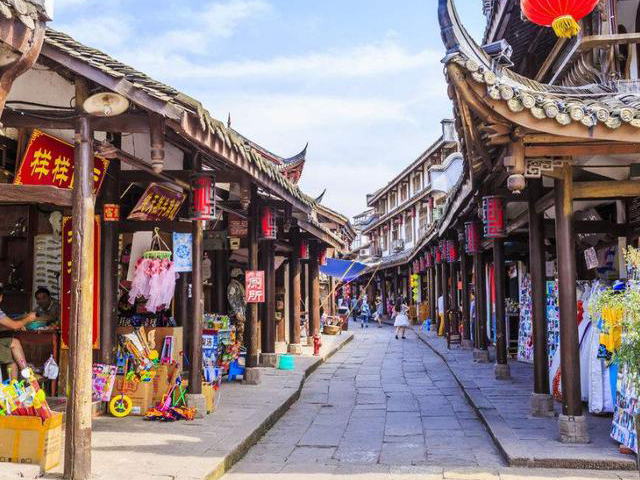
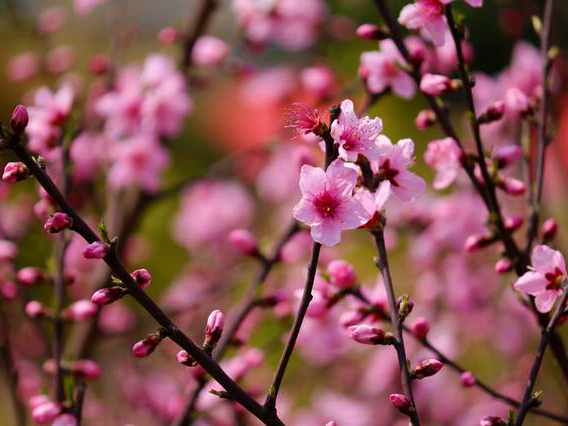
Longquan Mountain has the most prosperous peach blossom in Chengdu. In March, when all the peach flowers blossom, Chengdu International Peach Blossom Festival is held. Besides the performances, you will see the flower exhibitions, water dragon festivals, and more.
1.Tianfu Square - the largest square in southwest China and a square shaped like a giant Yin and Yang if seen from above.
2.People’s Park - a great place to mingle with locals and have a leisure time.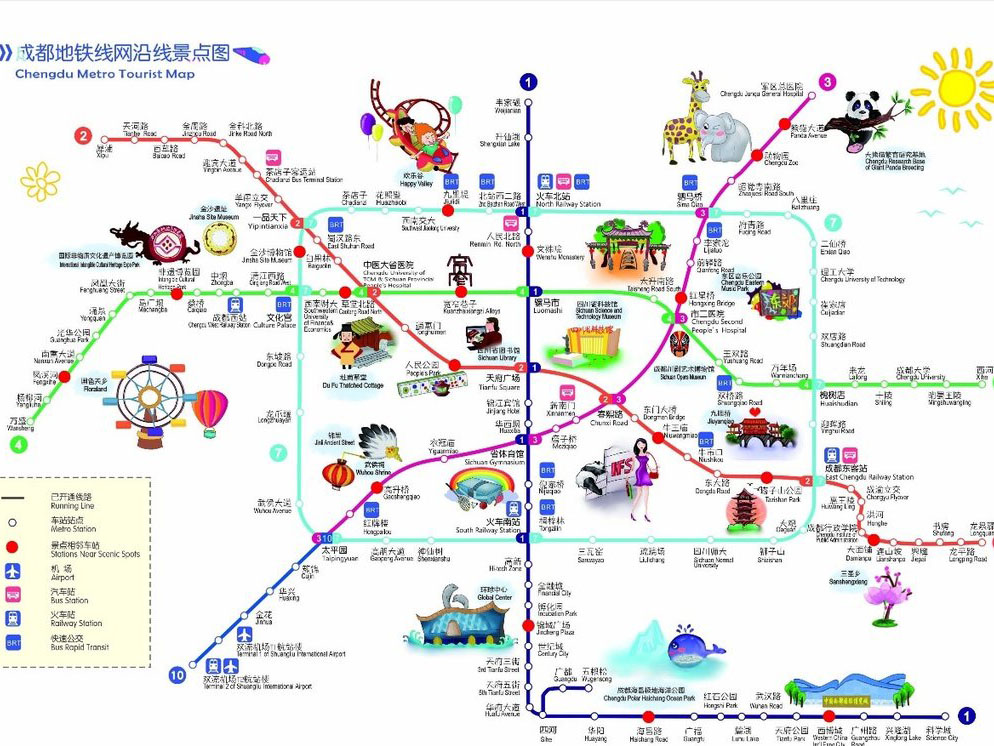
3.Wuhou Shrine - a place for photo shooting and Chinese culture.
4.Jinli Street - a paradise for Chengdu local food and handicraft.
5.Wenshu Monastery - the best-preserved temple in Chengdu and an amazing place for photography and Chinese culture.
6.Qingyang Palace - a Taoist temple with elegant architectures.
7.Kuan Zhai Alley - another food and art street where you can experience the authentic Chengdu local life.
8.Jinsha Site Museum - an entry to the Chengdu past - Shu Kingdom and a place with tons of relics on exhibition.
9.Sichuan Cuisine Museum - a museum dedicated to Sichuan food and culinary culture.
10.Qingcheng Mountain - one of the most famous Taoist mountains in China and a great place for relaxation.
11.Dujiangyan Irrigation System - the oldest and the only surviving no-dam irrigation system in the world.
7-day Chengdu Relaxing Tour 2 Days Chengdu Highlights Tour 2 Days Classic Chengdu Tour
Copyright © 2019 Lily Sun China Tours International, Inc. Terms &conditions | Privacy Policy | Sitemap